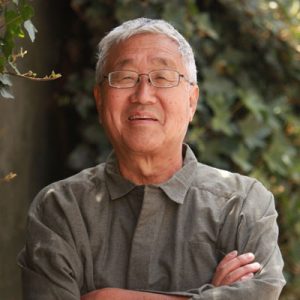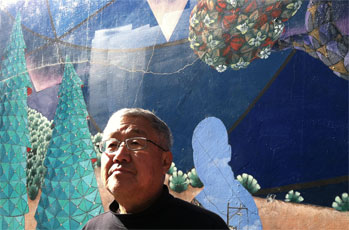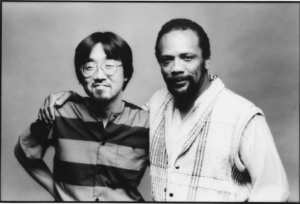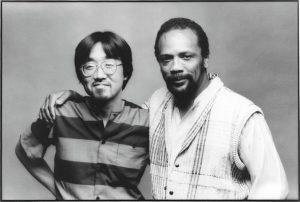
Makoto and Quincy Jones
Makoto is a third generation Japanese American musician.
Makoto is a third generation Japanese American (Sansei) musician. Being born during World War II had an immense effect on him. The anti-Japanese sentiment in the United States, coupled with the forced internment of Japanese Americans in camps, took its toll. Like other Sansei, Makoto was cut off from the roots of his culture. His parents weren’t allowed to speak or act in ways interpreted as Japanese for fear of being persecuted. He grew up in Colorado when it was unfriendly to Asians, especially Japanese. While hostile, Colorado was one of the only states that would accept Japanese Americans after they were released from the relocation camps. Makoto said he was always uncomfortable with his home state, and that he always felt like he was an immigrant there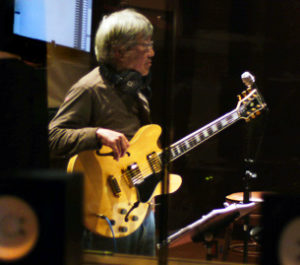
Makoto started playing guitar after rooming with Larry Coryell at the University of Washington in Seattle in the early sixties. At the time, Seattle had a thriving music scene in Jazz, Blues, and R&B. He subsequently studied with Bill Connors (a guitarist formerly with Chic Corea). Makoto went on to study composition with Davoud Johnson and the master musician, Julian Priester. Makoto’s vision was to create Asian American music that reflected his diverse cultural influences. Growing up, he listened to his parents’ pre-war music from Japan and the music of his generation: Jazz, Motown, Rock, Country and Blues.
In the seventies, Makoto met a group of artists, writers, and musicians who influenced his social process of identity. Makoto was searching for spiritual sustenance, while decolonizing his mind from the Eurocentric culture that permeates America. Makoto’s music was informed by his own culture and search for a unique, personal sound. The root of his sound was found in traditional Asian music and an Asian sensibility brought to the music. He was and is a voracious listener of music from all cultures, not only traditional, but also pop music.
Makoto organized groups of musicians to bring his compositions to life. He was one of the first composers to use traditional instruments in his compositions, along with other trailblazers like Gerald Oshita, Russel Baba, and the Asian American Band Hiroshima in the early seventies.
He was also the first Asian American composer to be signed to a major label. He was signed to Qwest Records by Quincy Jones, who is one of the quintessential arrangers/composers/producers of the all time. Makoto became a Qwest recording artist along with artists including Patti Austin and James Ingram. He was privy to one of the most successful artistic collaborations in the history of the music business, between Quincy Jones and pop star Michael Jackson.
On his first, self-titled “Makoto” album, he featured top Asian American musicians Philip Woo, Hiroyuki Shido, and Peter Fuji. Mr. Woo has played with Roy Ayers, Grover Washington Jr., Patti Labelle, Ashford and Simpson, Whitney Houston, Kubota (Japanese R&B singer), and Exile (Jpop).
Makoto’s second album, called “Nside,” was also released on Qwest Records. A collaboration with lyricist, vocal arranger, and songwriter Siedah Garrett (Man in the Mirror), it featured musicians from his first album. Vocalists Portia Griffin and Claytoven Richardson were vocalists. The second album is on the pop side of Makoto’s vision.
Makoto’s latest album, “Spirit of the Island,” is a musical tribute to music that comes from Hawaii, Jamaica, Cabo Verde, and Okinawa and other islands, as well as music from West Africa, particularly Mali. It features the drumming of Eric Gravatt (Weather Report, McCoy Tyner) in a completely different musical setting. Masaru Koga is the reedman. He is featured on a Japanese fue (flute), as well as soprano and tenor saxophones.
Makoto has subsequently released albums on his collaborative label, KulTone Records. Sybil Thomas, the daughter of Rufus Thomas, released an album called “Breathe.” in the contemporary music scene, Sybil has sung with Luther Vandross, George Duke, Roberta Flack, and Donnie Hathaway. Veteran studio singer Portia Griffin, aka “Portia G” released an album called “Portia Faces Life.” Portia was in Jeffery Osborne’s band and the band, Sweet Inspirations, started by Whitney Houston’s mother, Cissy Houston. Makoto feels that what is called R&B today doesn’t capture the intangible vibe that the music initially had. And he wants to create a bridge to the future with that feeling on his label’s albums.
Click on the Gallery link below to see posts from back in the day before the internet was even a thought.
| Song | Artist | Album |
| No Tellin’ | Makoto Horiuchi | Makoto |
| Equinox | Makoto Horiuchi | Nside |
| Funky Fuj | Makoto Horiuchi | Spirit of the Island |
| San Francisco Ondo | Makoto Horiuchi | Peaceful Island |
| Fook Sang (Rebirth) | Makoto Horiuchi | Makoto |
| Dark Mood | Makoto Horiuchi | Nside |
| Ancient Eyes | Makoto Horiuchi | Spirit of the Island |
| Spirit Dance | Makoto Horiuchi | Peaceful Island |
| Inside | Makoto Horiuchi | Makoto |
| Rich Man Poor Man | Makoto Horiuchi | Nside |
| Day In, Day Out | Makoto Horiuchi | Spirit of the Island |
| Tokio Dream | Makoto Horiuchi | Peaceful Island |
| Fragile-Handle With Care | Makoto Horiuchi | Makoto |
| Mindreader | Makoto Horiuchi | Nside |
| I Don’t Know (Instrumental) | Makoto Horiuchi | Spirit of the Island |
| Wings (Instrumental) | Makoto Horiuchi | Peaceful Island |
| Yin And Yang (Instrumental) | Makoto Horiuchi | Makoto |
| Spirit of the Island | Bass – Hiroyuki Shido Drums – Eric Gravatt Flute – Masaru Koga Keyboards, Guitar – Makoto* |
Nside |
| Ancient Eyes | Flute – George Abe, Masaru Koga Keyboards, Guitar – Makoto* Taiko, Percussion – Kenny Endo |
Spirit of the Island |
| Dreamin | Bass – Hiroyuki Shido Drums – Eric Gravatt Keyboards – Makoto Horiuchi Soprano Saxophone – Masaru Koga |
Peaceful Island |
| Dawn | Bass – Hiroyuki Shido Drums – Eric Gravatt Keyboards, Guitar – Makoto Horiuchi Percussion, Taiko – Kenny Endo |
Makoto |
| Funky Mr T | Bass – Hiroyuki Shido Drums – Eric Gravatt Keyboards, Guitar – Makoto Horiuchi Tenor Saxophone – Masaru Koga |
Nside |
| NeoSwing | Bass – Hiroyuki Shido Drums – Eric Gravatt Keyboards, Guitar – Makoto Horiuchi Tenor Saxophone – Masaru Koga |
Spirit of the Island |
| Ambrosia | Bass – Hiroyuki Shido Drums – Eric Gravatt Keyboards, Guitar – Makoto Horiuchi Soprano Saxophone – Masaru Koga |
Peaceful Island |
| Dreams | Bass – Hiroyuki Shido Drums – Eric Gravatt Keyboards, Guitar – Makoto Horiuchi Soprano Saxophone – Masaru Koga |
Makoto |
| Dusk | Bass – Hiroyuki Shido Drums – Eric Gravatt Keyboards, Guitar – Makoto Horiuchi Soprano Saxophone – Masaru Koga Vocal Percussion – Jamie Cesar |
Nside |
| Spirit Risin | Bass – Hiroyuki Shido Concert Grand Piano, Electric Piano – Marcus Choi Drums – Eric Gravatt Keyboards, Guitar – Makoto Horiuchi Soprano Saxophone – Masaru Koga |
Spirit of the Island |
| Talk to Me | Bass – Hiroyuki Shido Drums – Eric Gravatt Keyboards, Guitar – Makoto Horiuchi Tenor Saxophone – Masaru Koga |
Peaceful Island |
| Waltz 4 Chayez | Bass – Hiroyuki Shido Keyboards, Guitar – Makoto Horiuchi Piri – Yun Kyong Jin Soprano Saxophone – Masaru Koga |
Spirit of the Island |

